As a home cook or chef, you may have encountered recipes that call for an orange liqueur, such as Cointreau, Grand Marnier, or Triple Sec.
Orange liqueur is commonly used in various desserts, cocktails, and savory dishes because of its distinct sweet and bitter flavor.
However, not all kitchens/stores have orange liqueur readily available, or it may not be in your budget.
Fear not; I’ve got you covered! In this post, I will share with you my top 11 substitutes for orange liqueur.
I will not only introduce you to the substitutes but also guide you on how to use them.
Plus, I will give you the ratio to make sure your recipe tastes as phenomenal as it would with traditional orange liqueur!
In short, " What can I use instead of orange liqueur?" Orange Extract and Water, Orange Juice Concentrate, Orange Zest, Orange Syrup, Brandy or Cognac, Citrus Vodka, Triple Sec Syrup, Cointreau, Grand Marnier, Orange Bitters, and Spices.
What is orange liqueur, and what does orange liqueur taste like?
Orange liqueur is an alcoholic beverage made from oranges and can vary in taste depending on the type of oranges used.
Generally, it has a sweet and tart flavor with notes of orange peel, citrus, vanilla, caramel, spices like cinnamon or nutmeg and a hint of bitterness.
It can be enjoyed neat as an after-dinner drink or mixed into cocktails for a flavorful kick.
Uses of orange liqueur
Orange liqueur is a popular addition to many alcoholic cocktails and mixed drinks due to its sweet, tangy taste.
It can add a citrus zing to classic drinks such as the Margarita or be used to create unique signature cocktails.
Orange liqueur is also commonly used for baking recipes, adding flavor to desserts and other confections. Popular brands of orange liqueur include Cointreau, Grand Marnier, and triple sec.
The alcohol content in these varieties can range from 15-50 percent ABV (alcohol by volume).
Orange liqueur can add an interesting depth of flavor to savory dishes as well. It can be used in marinades, glazes or sauces for meat and seafood dishes, providing a hint of sweetness that complements saltiness or spiciness.
Orange liqueur adds complexity to salad dressings or vinaigrettes when combined with other ingredients such as olive oil, vinegar, and spices.
Its distinctive flavor has been used to make unique ice creams flavors such as creamsicles or orange sherbet.
The use of orange liqueur dates back hundreds of years.
The French first created it in 1714 using only distilled spirits and oranges grown near the distillery in the town of Angers.
The process used to make orange liqueur involves steeping orange peels in alcohol for several weeks, allowing the fragrant oils from the citrus peel to infuse into the spirit.
This process results in a complex blend of flavors, including candied fruit, bittersweet chocolate and roasted coffee notes.
Where to buy orange liqueur?
If you are looking for where to buyorange liqueur, there are a few different places you can go. Many specialty food stores carry it, as do some international grocery stores.
You can also order online from many retailers that provide a variety of diverse flavors and types of orange liqueur.
Best substitutes for orange liqueur
1. Orange Extract and Water –a good substitute for orange liqueur
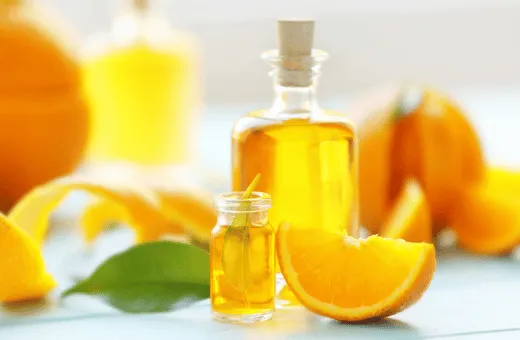
Orange extract mixed with water is an easy and straightforward substitute for orange liqueur.
Ratio or measurement: Simply mix 1 tablespoon of orange extract with 2 tablespoons of water to replace 2 tablespoons of orange liqueur.
If you want to increase the amount, just double or triple the ingredients. It is a quick and easy method to add orange flavor to your recipe.
2. Orange Juice Concentrate
Orange juice concentrate is a great substitute for orange liqueur. It’s made from orange juice with the water removed, resulting in a concentrated orange flavor.
Ratio or measurement: Mix 2 tablespoons of orange juice concentrate with 2 tablespoons of water to replace 2 tablespoons of orange liqueur.
Ensure you balance any extra sweetness, sugar or juice in the recipe to avoid altering its taste.
3. Try Orange Zest in place of orange liqueur
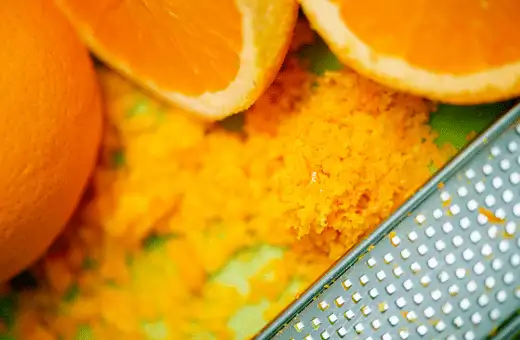
If you do not have orange extract or concentrate, then using orange zest might be your perfect alternative!
The zest of orange is the outermost layer, which contains natural oils that give the orange its distinct aroma and flavor.
Finely grind the zest of an orange and mix it with water or orange juice to create an orange liqueur’s vibrant citrus flavor.
Ratio or measurement: The general rule of thumb is that one medium-sized orange will yield about 1 tablespoon of zest, enough for 2 tablespoons of orange liqueur.
4. Orange Syrup
The orange syrup is an excellent replacement for an orange liqueur, especially when it comes to baking.
Ratio or measurement: Mix together equal parts of pure orange juice and sugar and let it simmer until the liquid reaches a thick syrup consistency.
You can replace orange liqueur with an equal amount of orange syrup in your recipe.
Orange syrup pairs well with dark chocolate and can be drizzled over cakes or pancakes for a tasty treat.
5. Brandy or Cognac – a tasty alternative for orange liqueur
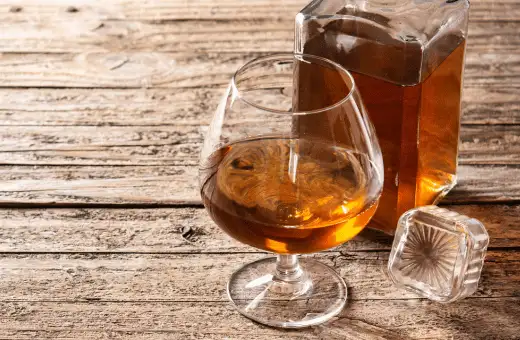
Both (Brandy and Cognac) types of liquor have a similar robust flavor that mixes well with citrus ingredients in recipes that require orange liqueur.
They have lesser sweetness, but the warm and full-bodied taste is a great substitute in cooking or baking recipes that benefit from the orange liquor notes.
Ratio or measurement: Use the same amount you would for the orange liqueur the recipe calls for.
Keep in mind that Brandy has a stronger taste, so you might want to use slightly less than the recipe calls for.
6. Citrus Vodka
Citrus Vodka has a light orange flavor and is an excellent substitute for orange liqueur.
Ratio or measurement: Mix 1 tablespoon of citrus Vodka with 2 tablespoons of orange juice to replace 2 tablespoons of orange liqueur.
It is an excellent choice for adding that extra orange flavor to cakes, dessert sauces, and gourmet meals.
7. Triple Sec Syrup – similar taste to orange liqueur
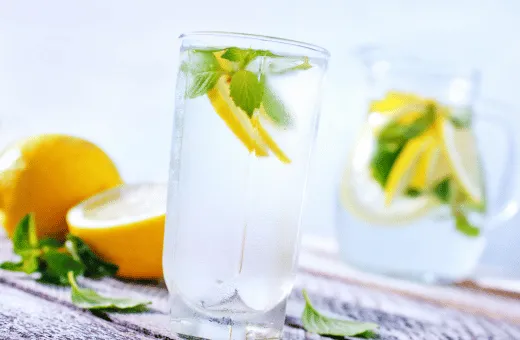
Triple Sec Syrup is the best substitute for Cointreau, Triple Sec, or Grand Marnier.
Ratio or measurement: To create Triple Sec Syrup, combine 1/2 cup of sugar with 1/2 cup of water and hair a strip of orange zest in the mixture.
Let it boil for five minutes, take it off the heat, and add 2 tablespoons of fresh orange juice to the syrup. Allow to cool and strain; this amount is equivalent to 1 cup of Triple Sec.
Mix with the same amount as the recipe calls for.
8. Cointreau
This is a classic orange liqueur that you can find in almost every liquor store. Cointreau is created with sweet and bitter orange peels, and this substitutes the same way you would use orange liqueur in cocktails.
It contains 40% alcohol, so use half the amount of the recipe that calls for orange liqueur.
Ratio or measurement: For example, if the recipe requires 1 oz of orange liqueur, use 1/2 oz Cointreau.
9. Grand Marnier – a decent replacement for orange liqueur
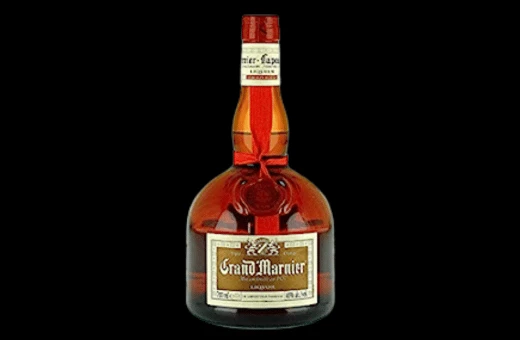
This is slightly sweeter than Cointreau, made with cognac instead of neutral grain spirits.
Grand Marnier is also more expensive but provides a deeper and richer orange flavor. If the recipe has a mild orange taste, Grand Marnier might overpower it.
Ratio or measurement: Therefore, use half the amount required for an orange liqueur, like Triple Sec.
10. Orange Bitters
If you’re looking for an exceptional way to add another dimension of flavor to cocktails once in a while, try adding orange bitters.
Orange bitters add a depth of natural orange flavor that’s not too sweet or overpowering.
Ratio or measurement: Add two-three dashes to your cocktail to give it the desired flavor.
11. Spices – an ideal substitute for orange liqueur
Spices like cinnamon, nutmeg, and cloves, when used in combination, have a distinct flavor that mimics the orange liqueur profile.
Ratio or measurement: If you're adding spices to your recipe, start with a small quantity, then adjust to taste.
However, do not overdo it, as it can alter your recipe’s final flavor profile.
Tips on How to Choose the Most Suitable Substitution Option for orange liqueur
When choosing a suitable substitution option for orange liqueur in recipes, consider the following tips:
1. Flavor Profile: Orange liqueur typically has a strong, sweet, and citrusy flavor. Look for alternatives that can replicate or complement this flavor profile.
Options such as orange extract, orange juice concentrate, or orange zest can be used to add the desired citrusy notes to your recipe.
2. Alcohol Content: Orange liqueur contains alcohol, which contributes to its distinctive flavor.
If you prefer an alcohol-free option, consider using orange extract or orange-flavored syrups, which can provide a concentrated burst of orange flavor without the alcohol content.
3. Sweetness Level: Take into account the sweetness of the orange liqueur and adjust the sweetness of the substitute accordingly.
If your recipe calls for a sweet orange liqueur, you may need to add some additional sweetener, such as simple syrup or honey, to achieve the desired level of sweetness.
4. Recipe Compatibility: Consider how the substitute will interact with the different ingredients in your recipe.
If the orange liqueur is a significant component of the dish, such as in a classic cocktail or a specific dessert, it’s best to use a substitute that closely matches the flavor and characteristics.
However, if the orange liqueur is a minor ingredient, alternatives like orange juice or orange zest can work well.
5. Experiment and Adjust: Conduct small tests by substituting the orange liqueur with your chosen alternative in a small portion of the recipe. Taste and assess the impact on flavor and overall satisfaction.
Adjust the quantities or make any necessary modifications based on your taste preferences and the desired outcome.
6. Consider Non-Alcoholic Alternatives: If you prefer to avoid alcohol entirely, explore non-alcoholic options such as orange extracts, orange-flavored syrups, or even orange juice to provide the citrus flavor without the alcohol content.
What can I use rather than orange liqueur in a margarita?
An alternative to orange liqueur in a margarita is triple sec. Triple sec is a type of orange-flavored liqueur made by distilling dried peels of bitter and sweet oranges.
It has a slightly more elevated alcohol content than its counterparts, making it perfect for use in cocktails like the margarita.
Triple sec can also add flavor complexity to the drink, as it imparts a more robust and citrusy taste than other orange liqueurs.
Additionally, it gives the margarita its signature golden hue, making it an attractive serving option.
What can I use rather than orange liqueur for Cosmopolitan?
One possible alternative to orange liqueur for a Cosmopolitan is Grand Marnier. It is an orange-flavored liqueur made from a blend of Cognac brandy and distilled essence of bitter oranges.
Grand Marnier has a strong orange flavor, but it also contains hints of spices such as vanilla, nutmeg and cloves.
This adds complexity to the drink, making it more interesting than using just plain orange liqueur.
Another option could be Cointreau, which is a clear, colorless triple sec type of orange liqueur that is produced from sweet and bitter oranges.
Cointreau can bring out the tartness of the cranberry juice while still allowing you to get the citrusy orange flavor in the drink.
Both Grand Marnier and Cointreau would make great additions to your Cosmopolitan cocktail!
non-alcoholic substitute for orange liqueur
1. apple cider vinegar
One of the best non-alcoholic substitutes for orange liqueur is apple cider vinegar. This acidic ingredient can be used to add a subtle tartness and complexity to recipes that call for orange liqueur.
Incorporate 1/4 cup of apple cider vinegar with 3 tablespoons of honey and 1 tablespoon of brown sugar for every 1/4 cup of orange liqueur called for in the recipe.
The mixture should be simmered in a small saucepan over low heat until it slightly thickens and then cooled before adding it to the dish.
2. cranberry juice concentrate
Another popular alternative to orange liqueur is cranberry juice concentrate.
To replace the tartness of the orange liqueur, combine ¼ cup of concentrate with 2 tablespoons of sugar syrup or simple syrup.
This combination should be simmered in a medium saucepan until slightly thickened before adding it to the recipe.
3. Ginger beer
Ginger beer is also an excellent non-alcoholic substitute for orange liqueur.
When substituting, use ½ cup ginger beer for every 1/4 cup required by the recipe and reduce other liquids accordingly.
Ginger beer adds complementary spice notes that pair well with oranges and other citrus fruits, making it ideal as a substitute in recipes such as sorbets and sauces.
4. Pineapple juice
Pineapple juice can also be used as an alternative to orange liqueur; simply use ¼ cup pineapple juice plus 2 tablespoons vegetable oil or melted butter for each ¼ cup called for in the recipe.
Alternatively, try using ½ cup unsweetened pineapple juice along with 2 teaspoons white balsamic vinegar and one teaspoon honey as a substitute; this combination will give some additional acidity while providing sweetness without overpowering the dish.
5. honey
Last but not least, honey can also be used as an effective non-alcoholic stand-in for orange liqueur.
For each ¼ cup required by the recipe, use 1/3 cup honey mixed with 1 tablespoon of fresh lemon juice or lime juice; simmer until slightly thickened and then cool before adding it to your dish.
The citrus helps cut through some of the sweetness while still preserving delicious flavor notes from both ingredients.
Substitute for orange liqueur in baking
When baking with orange liqueur, you can substitute it with a combination of other ingredients to approximate the flavor.
A common substitution for about 1/4 cup of orange liqueur is 1/4 cup of freshly-squeezed orange juice combined with 1 tablespoon of sherry, Grand Marnier, or Cognac.
This ratio will help create the same richness and complexity that a liqueur would in your recipe.
You can also replace a similar amount of orange extract plus 1/2 teaspoon of vodka to further enhance the flavor.
The vodka will help bring out the flavor of the orange extract without adding too much additional alcohol content.
Substitute for orange liqueur in the recipe
If you want to substitute orange liqueur in a recipe, Grand Marnier is a great choice. This cognac-based orange liqueur adds a complex blend of sweet and bitter citrus flavors that enhance many recipes.
Since Grand Marnier is 40% alcohol, you’ll need to adjust the ratio of other ingredients used in the recipe.
For instance, if your recipe calls for 1/4 cup of orange liqueur, you can substitute it with 3 tablespoons of Grand Marnier and 1 tablespoon of Cointreau or triple sec.
This combination gives the dish an orange flavor comparable to using the original amount called for in the recipe but without adding as much alcohol content.
If you don’t have access to Cointreau or triple sec, you can utilize any other type of sweetened orange juice or zest as well.
substitute for orange liqueur in sangria
When making sangria, a popular Spanish beverage, orange liqueur can be substituted with a variety of other ingredients for different flavor profiles.
Substituting for orange liqueur is relatively simple and easy to do with the proper ratio. Some great alternatives include brandy, cognac, triple sec or Grand Marnier instead of liqueur.
White wine can also be used in place of any type of fruity liqueur.
Brandy and cognac are both distilled from grapes and add a strong flavor with hints of oak. Triple sec is an orange-flavored liqueur that adds the citrus notes often associated with sangria.
Grand Marnier is created from cognac and bitter oranges macerated in Cognac distillate and adds a sweet, flavorful zing.
White wine may also be used as an alternative to any type of fruity liqueur when creating sangria.
When using white wine instead of liqueur, it is best to use a low-acid variety such as Chardonnay or Sauvignon Blanc at a 1:1 ratio with the red wine in the recipe.
The amount of any alternative ingredient should also take into account how much sweetness or tartness you would like in your finished product.
It’s always best to taste as you go to ensure that all flavors are balanced before serving up your delicious creation!
Conclusion on substitute for orange liqueur
In conclusion, substituting orange liqueur in a recipe isn’t rocket science. With the above alternatives, you can still achieve a rich and distinct orange flavor, even without the actual orange liqueur.
It’s essential to measure the substitutes carefully to avoid overdoing the flavors or altering the final recipe. As a rule of thumb, start with less quantity, then add more slowly as required.
Whether you choose to use Cointreau, fresh orange juice or zest, brandy, Grand Marnier, spices, or orange extract, make sure it complements the rest of the ingredients and tickles your taste buds!
FAQs on substitute for orange liqueur
Q1. What is similar to orange liqueur?
A similar liqueur to orange liqueur is mandarin liqueur. This spirit is made from the same citrus family as oranges and boasts a unique flavor with bright, sweet notes of mandarin oranges.
It can be relished neat, over ice, or as an ingredient in various cocktails.
Mandarin liqueur is also very versatile and can be used to make a variety of drinks, such as martinis, margaritas, mojitos, and daiquiris.
Additionally, it’s often used in desserts for added zest and flavor to cakes, pastries and other treats.
Q2. What liqueur tastes like orange?
Grand Marnier is an orange liqueur made with a blend of cognac and orange essence.
It has a distinct sweet, citrusy flavor that makes it a popular addition to many cocktails. The liqueur is bottled in two varieties.
Grand Marnier, which is 80 proof; and Grand Marnier Cordon Rouge, which is 100 proof. Grand Marnier has been around since 1880 and was created by the founder of the company, Louis-Alexandre Marnier Lapostolle.
For its unique taste profile, some people describe Grand Marnier as tasting like “liquid orange marmalade”.
Its bold flavor also contains hints of vanilla and almond, making it an ideal ingredient for creating decadent cocktails or desserts such as soufflés.
Q3. Can triple sec be substituted for orange liqueur?
Yes, triple sec can be substituted for orange liqueur in a variety of cocktails.
Triple sec is a type of orange-flavored liqueur made from either dried oranges or bitter and sweet oranges. It has a powerful citrus flavor and aroma, with hints of almond and vanilla.
While similar to orange liqueur, the triple sec has a drier finish and slightly higher ABV (alcohol by volume) than many traditional orange liqueurs. Additionally, it adds a unique sweetness that can enhance the flavors of some cocktails.
Q4. Can I substitute orange juice for orange liqueur?
No, you cannot substitute orange juice for orange liqueur. Orange juice is made from oranges and has none of the alcohol content that is found in liqueurs.
Liqueurs have an alcoholic content of around 20-40%, depending on the type.
Orange liqueur, specifically, is a combination of brandy or rum with sugar and the peels and juices of oranges, which gives it its sweet flavor profile.
Q5. Can I substitute orange liqueur for a triple sec?
Yes, you can substitute orange liqueur for triple sec.
Orange liqueurs are made with a base spirit, such as brandy or vodka, and flavored with orange essence or orange extracts. They often contain subtle flavors of herbs and other citrus fruits.
Triple sec is also an orange-flavored liqueur that is made from the dried peel of Curaçao oranges. It has a powerful sweet taste with a hint of bitter orange flavor.
Substituting one for the other in cocktails will slightly alter the flavor profile of the drink, but it will still work fine overall.

